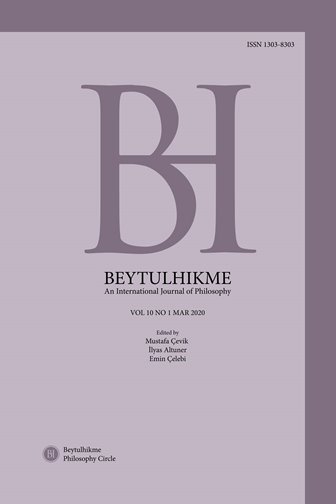Author :
Abstract
Yaşayan filozoflardan Alain Badiou çağımızda ivedilikle Platon’a ihtiyaç olduğunu ileri sürerek kendisini bir Platoncu olarak sunar. Badiou’nun Platon’u kendisi için kurucu bir figür olarak alması tartışmaya açıktır. Çünkü Platoncu olmanın neredeyse bir hakaret olarak algılandığı bir çağda Badiou’nun kendini bir Platoncu olarak takdim etmesi ve kendisi materyalist olan ismin bunu Platon’un idealist bir filozof olmasına rağmen yapması problematik olarak görülür. Tüm bu tartışmalara rağmen Badiou çağının anti-Platonculuğuna karşı çıkarak felsefeyi bugünkü hasta görüntüsünden kurtaracak hamleyi Platonculukta bulur. Makalede Badiou’nun Platonculuğu Matematik, Hakikat, Demokrasi eleştirisi ve İdea kavramı olmak üzere dört temel noktadan hareketle verilmeye çalışılmıştır. Bu dört noktanın belirlenmesinde onun iki temel eseri Felsefe için Manifesto ve Felsefe için İkinci Manifesto etkili olmuştur. Ayrıca Badiou’nun Platon’un Devlet diyaloğunu yeniden yazması da onun Platonculuğu bağlamında ele alınmaya çalışılmıştır.
Keywords
Abstract
Alain Badiou, one of the living philosophers presents himself as a Platonist claiming that Plato is urgently needed in our age. It is debatable that Badiou takes Plato as a founding figure for himself. For, in an era in which being a Platonist is almost perceived as an insult, it is thought as problematic that Badiou presents himself as a Platonist and this person who has a materialist name does this in spite of the fact that Plato is an idealist philosopher. Despite all these discussions, Badiou opposes the anti-Platonism of his age and finds the move to save philosophy from today’s patient image in Platonism. In the article, Badiou’s Platonism is tried to be given from four basic points: Mathematics, Truth, Democracy Criticism and the concept of Idea. His two main works, the Manifesto for Philosophy and the Second Manifesto for Philosophy influence in determining these four points. In addition, Badiou's rewriting of Plato’s State Dialogue was tried to be considered in the context of his Platonism.
Keywords
- Annas, J. (2003). Plato: A Very Short Introduction. New York: Oxford University Press.
- Annas, J. (2015). Antik Felsefe. (Çev. T. T. Yiğit). Ankara: Dost Kitabevi.
- Badiou, A. (2003). Beyond Formalisation an Interview. (Trans. B. Bosteels & A. Toscano). Angelaki: Journal of the Theoretical Humanities, 8 (2), 111-136.
- Badiou, A. (2009). Logics of Worlds: Being and Event II. (Trans. A. Toscano). New York: Continuum.
- Badiou, A. (2011a). Komünizm İdea’sı. A. Badiou & S. Zizek vd. Bir İdea Olarak Komünizm. (Çev. A. Ergenç & E. Kılıç). İstanbul: Ayrıntı Yayınları.
- Badiou, A. (2011b). Second Manifesto for Philosophy. (Trans. L. Burchill). Malden: Polity Press.
- Badiou, A. (2012). Sonsuz Düşünce. (Çev. I. Ergüden & T. Birkan). İstanbul: Metis Yayınları.
- Badiou, A. (2013a). Başka Bir Estetik. (Çev. A. U. Kılıç). İstanbul: Metis Yayınları.
- Badiou, A. (2013b). Etik. (Çev. T. Birkan). İstanbul: Metis Yayınları.
- Badiou, A. (2013c). Yeni Bir Siyaset İçin Felsefe. (Çev. B. Özkul & E. Ünal). İstanbul: Encore Yayınları.
- Badiou, A. (2015a). Platon’un Devleti. (Çev. S. Ergül). İstanbul: Metis Yayınları.
- Badiou, A. (2015b). Felsefe İçin Manifesto. (Çev. M. Erşen). İstanbul: Monokl Ya- yınları.
- Badiou, A. (2019). Platon, Bizim Sevgili Platon’umuz! Pasajlar, 3, 23-26.
- Badiou, A. (2019). Deleuze: Varlığın Uğultusu. (Çev. M. Erşen). İstanbul: Monokl
- Badiou, A. & Tarby, F. (2013). Philosophy and Event. (Trans: L. Burchill). Malden:
- Badiou, A. & Zizek S. (2009). Felsefe ve Güncellik. (Çev. Ö. Aktok). İstanbul: Enco- re Yayıncılık.
- Barlett, A. J. (2010). Plato. Badiou: Key Concepts. (Eds. A. J. Bartlett & J. Clemens). Durham: ACUMEN.
- Blackburn, S. (2014). Devlet ve Platon. (Çev. M. Yüksel & M. Baturay). İstanbul: Versus Kitap.
- Direk, Z. (2014). Önsöz. J. Derrida Platon’un Eczanesi. (Çev. Z. Direk). İstanbul: Pinhan Yayıncılık.
- Direk, Z. (2016). Sunuş. E. Levinas. Sonsuza Tanıklık. (Der. Z. Direk). İstanbul: Metis Yayınları.
- Ergül, S. (2015). Alain Badiou’nun Çokluk Ontolojisi. Ethos: Felsefe ve Toplumsal Bilimlerde Diyaloglar, 8 (1), 64-90.
- Güzel, C. (2003). Platon’un Bilgi Görüşü. Hacettepe Üniversitesi Edebiyat Fakültesi Dergisi, 20 (2), 105-115.
- Heidegger, M. (2007). Nietzsche’nin Platonculuğu Tersine Çevirmesi. Cogito, 25, 134-141.
- Nietzsche, F. (2010). İyinin ve Kötünün Ötesinde. (Çev. A. İnam). İstanbul: Say
- Odabaş, U. K. (2018). Platon: Hayatı ve Felsefesi. Ankara: Araştırma Yayınları.
- Platon (2008). Devlet. (Çev. E. Bayram). İstanbul: Beyan Yayınları.
- Platon (2015a). Şölen. (Çev. S. Eyuboğlu & A. Erhat). İstanbul: Türkiye İş Bankası Kültür Yayınları.
- Platon. (2015b). Timaios. (Çev. F. Akderin). İstanbul: Say Yayınları.
- Popper, K. (2013). Açık Toplum ve Düşmanları. (Çev. M. Tunçay & H. Rızatepe). Ankara: Liberte Yayınları.
- Williams, J. (2012). A Critique of Alain Badiou's Denial of Time in His Philo- sophy of Events. Badiou and Philosophy. (Eds. S. Bowden & S. Duffy). Edinburgh: Edinburgh University Press, 113-132. Öz: Yaşayan filozoflardan Alain Badiou çağımızda ivedilikle Platon’a ihtiyaç olduğunu ileri sürerek kendisini bir Platoncu olarak sunar. Badiou’nun Platon’u kendisi için kurucu bir figür olarak alması tartışmaya açıktır. Çünkü Platoncu olmanın neredeyse bir hakaret olarak algılandığı bir çağda Badiou’nun kendini bir Platoncu olarak takdim etmesi ve kendisi materyalist olan ismin bunu Platon’un idealist bir filozof olmasına rağmen yapması problematik olarak görülür. Tüm bu tartışmalara rağmen Badiou çağının anti-Platonculuğuna karşı çıkarak felsefeyi bugünkü hasta görüntüsünden kurtaracak hamleyi Platonculukta bulur. Makalede Badiou’nun Platonculuğu Matematik, Hakikat, Demokrasi eleştirisi ve İdea kavramı olmak üzere dört temel noktadan hareketle verilmeye çalışılmıştır. Bu dört noktanın belirlenmesinde onun iki temel eseri Felsefe için Manifesto ve Felsefe için İkinci Manifesto etkili olmuştur. Ayrıca Badiou’nun Platon’un Devlet diyaloğunu yeniden yazması da onun Platonculuğu bağlamında ele alınmaya çalışılmıştır. Anahtar Kelimeler: Platon, Badiou, hakikat, matematik, idea, demokrasi, komünizm.





